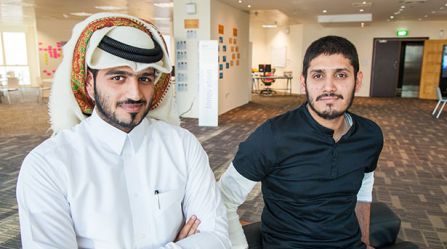
Doctor Disruption in Doha
The idea for Meddy came from a snippet of conversation Haris Aghadi overheard at a family gathering: could you recommend a good doctor?
He had heard similar conversations for years—Aghadi, a Pakistani national, was born and raised in Qatar—but this particular day, the question struck a chord. He and Abdulla AlKhenji, then Information Systems students, were investigating the feasibility of a professional network for physicians, a type of LinkedIn for doctors.
Unfortunately, the idea was fizzling. “We soon realized that doctors are not very tech savvy, they don’t use the internet to market and network the way they do in other industries,” said Aghadi.
This one question by the family member turned them in a different direction. If doctors are not tech savvy—few have websites and even fewer keep them current—how are new expats supposed to find them? This was the beginning of Meddy, an app that works like a word-of-mouth recommendation, providing a list of doctors by specialty, as well as credentials and reviews from patients.
Aghadi and AlKhenji launched the app in September 2014 with a list of 200 doctors. Meddy began to gather steam almost immediately, spurred on by the Doha media who recognized the potential. “Our next step was to aggregate data, to learn what people want to see on the app. We ended up revamping the entire technical infrastructure, so we could add information like subspecialty and residency or fellowship training,” said Aghadi.
Each start-up, including Meddy, comes with a unique set of challenges. A start-up is distinctly different from starting a business like a restaurant or retail outlet: there is no established business model, so the path forward involves solving a series of new, unexpected problems. For Meddy, one of the looming challenges was government relations: “We wanted to partner with the Supreme Council of Health, there were so many levels of bureaucracy we faced, it was a much bigger job than we anticipated,” said Aghadi.
“Taking your idea to the next level and turning it into reality is a full-time job that requires a lot of dedication and support,” said Maher Hakim, associate professor of entrepreneurship at CMU-Q. Hakim served as a mentor before Aghadi and AlKhenji graduated, and continues to offer advice and guidance.
Meddy was given a boost when they were accepted by the Digital Incubation Center (DIC), formerly under the ictQatar banner. DIC offers Aghadi and AlKhenji mentoring and a connection to experts in law, consulting, accounting, and other areas where a start-up may need help. Meddy now operates out of the DIC with several other start-ups, together occupying a floor of the ictQatar building where they can work, meet with clients, and listen to talks by mentors and industry experts.
“The Digital Incubation Center has been great. They take early start-ups, help to improve the products, introduce us to investors and experts in business and marketing. The purpose is to foster entrepreneurship in the country,” said Aghadi.
With the support of the Digital Incubation Center, as well as Hakim, who continues to advise the project, Meddy has grown to over 1000 doctors and 130 private clinics.
They are also developing revenue streams. Meddy offers clinics advertising space so they can reach out to potential clients, as well as a ‘book now’ feature so patients can contact the clinic through the app.
“Our next big thing is to release the site in Arabic. There are many Qataris and Arab-speaking expats whose preferred language is Arabic,” Aghadi commented. The Arabic site will launch in spring 2016.
As they move forward, Aghadi emphasized that their main job is deeper than selling doctors on participation or advertising. “We are changing the mentality of doctors, so they consider reaching patients online,” he said.
